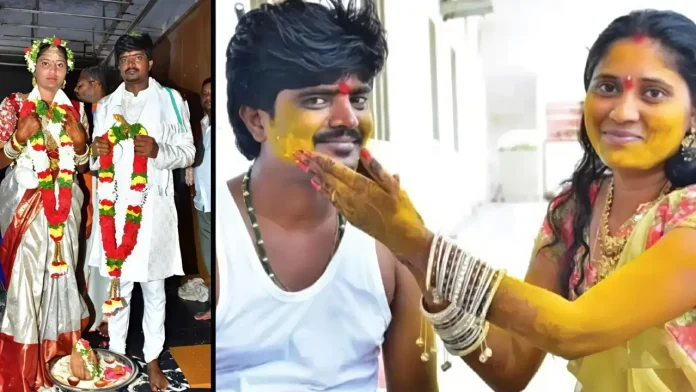In a chilling case that has gripped Telangana and drawn comparisons to the infamous Meghalaya honeymoon murder, a 32-year-old land surveyor and dance teacher, Ganta Tejeshwar, was brutally murdered just a month after his wedding on May 18, 2025.
The prime conspirators, his 23-year-old wife, Aishwarya, and her lover, V. Tirumala Rao, a 35-year-old bank manager, allegedly orchestrated the crime with the help of six others, including Aishwarya’s mother, Sujatha, and hired contract killers.
The case, unfolding in Jogulamba Gadwal district, has shocked the nation with its intricate web of deceit, illicit relationships, and premeditated violence.
On June 26, 2025, police arrested eight individuals, recovering two machetes, a knife, ten mobile phones, and a GPS tracker used to track Tejeshwar’s movements.
This article delves into the harrowing details of the case, the motives behind the murder, and its broader implications.
A Marriage Marred by Deception
Tejeshwar, a resident of Jogulamba Gadwal district, married Aishwarya, also known as T. Sahasra, from Kurnool district, Andhra Pradesh, on May 18, 2025, at Anjaneyaswamy Temple in Beechupalli.
The marriage, arranged after a brief engagement in December 2024, was fraught with red flags from the start.
Days before the engagement, Aishwarya had gone missing, allegedly eloping with Tirumala Rao, a married bank manager at Canfin Homes in Kurnool.
She returned, claiming she had only visited a friend due to family pressure over dowry issues, convincing Tejeshwar and his family to proceed with the wedding.
However, Tejeshwar’s family, including his elder brother Tejavardhan, had warned him against the marriage, suspecting Aishwarya’s involvement with Rao.
Trouble surfaced immediately after the wedding. Aishwarya, who spent 15 of the 29 days of her married life in Kurnool, was frequently on the phone, exchanging over 2,000 calls and hundreds of messages with Rao between February and June 2025.
Tejeshwar noticed her emotional distance and frequent communication with someone else, raising his suspicions.
Call data records later confirmed the extent of her communication with Rao, including video calls during her wedding and even on the day of the murder.
The motive, police revealed, was twofold: Aishwarya and Rao’s desire to continue their illicit relationship and their interest in Tejeshwar’s property and assets.
A Meticulously Planned Murder
The murder was a calculated operation, planned with chilling precision. Tirumala Rao, identified as the mastermind, had been in a relationship with Aishwarya’s mother, Sujatha, a sweeper at his office, since 2016.
When Sujatha was unavailable, Aishwarya filled in at the bank, where she too began a relationship with Rao.
Despite his own marriage in 2019, Rao promised to marry Aishwarya, leading to a complex love triangle involving both mother and daughter.
Sujatha, aware of her daughter’s affair, pressured Aishwarya to marry Tejeshwar to maintain her own relationship with Rao, but Aishwarya continued her affair post-marriage.
The conspiracy began months before the wedding, with Rao confiding in Kummari Nagesh, a known associate, about his desire to “do something about Tejeshwar.”
Rao provided Nagesh with Tejeshwar’s phone number and instructed him to befriend the victim under the pretext of a land deal.
To monitor Tejeshwar’s movements, Rao ordered a GPS tracker online, which Nagesh and his associates, Chakali Parashuram and Chakali Raju, attached to Tejeshwar’s motorcycle.
The group made five failed attempts to kill Tejeshwar, including one a week before the wedding, but succeeded on their sixth attempt on June 17, 2025.
On the morning of June 17, Nagesh contacted Tejeshwar, luring him to a meeting near Krishna Reddy Bungalow in Gadwal under the guise of surveying a 10-acre plot.
Tejeshwar, trusting the pretext, joined Nagesh, Parashuram, and Raju in a rented car with blacked-out windows. The group drove to Mogali Ravula Cheruvu, stopped for breakfast, and feigned a car breakdown to delay Tejeshwar.
Around 11 a.m., while en route between Erravalli and Gadwal, Parashuram attacked Tejeshwar from behind, striking his head with a sickle. As Tejeshwar screamed, the assailants slit his throat and stabbed him in the stomach, killing him inside the vehicle.
After the murder, the killers contacted Rao via WhatsApp, and the group drove across the Krishna River, discarding Tejeshwar’s phone, laptop, and weapons near Gurramgadda.
The body was dumped in bushes near the Galeru Nagari canal in Panyam, Andhra Pradesh, approximately 30-40 km from Kurnool.
Rao joined the group at a real estate site in Panchalingala, paying Nagesh, Parashuram, and Raju Rs 2 lakh for the hit, with an additional Rs 3,500 sent earlier via a digital payment app for expenses.
Unraveling the Conspiracy
Tejeshwar was reported missing by his brother on June 17, prompting Gadwal police to register a case. The investigation gained traction when a body was found in Panyam on June 21, identified as Tejeshwar’s due to a Telugu tattoo reading “Amma” on his forearm.
CCTV footage, call data records, and local intelligence led police to Aishwarya, who remained silent for four days under questioning before confessing.
Sujatha also admitted her role, revealing the involvement of Rao and the contract killers. The arrested individuals included Aishwarya, Sujatha, Rao, Nagesh».
System: Parashuram, Raju, A. Mohan, Tirupatayya, and a neighbor, Jagan, who acted as a lookout.
The police seized two machetes, a knife, ten mobile phones, a GPS tracker, and the rented car used in the crime.
Aishwarya and Rao’s communications, including discussions about avoiding mistakes from the Meghalaya honeymoon murder case involving Raja Raghuvanshi, revealed their intent to mislead investigators by staging the crime as a murder-cum-kidnapping.
Rao had even planned to flee to Ladakh with Aishwarya and considered killing his own wife due to their childless marriage of eight years.
A Case Echoing the Meghalaya Murder
The Tejeshwar-Aishwarya case has drawn parallels with the Meghalaya honeymoon murder, where Sonam Raghuvanshi plotted her husband Raja’s death with her lover.
Both cases involve newlywed wives conspiring with their lovers to eliminate their husbands, using hired killers and meticulous planning.
In the Meghalaya case, police explored motives beyond the affair, including business interests, while in Telangana, the motives centered on Aishwarya and Rao’s relationship and Tejeshwar’s assets.
The similarities have sparked national discussions about marital betrayal and the rising use of contract killers in domestic disputes.
Gadwal Superintendent of Police T. Srinivasa Rao emphasized the role of digital evidence in cracking the case, stating, “This case reflects how unchecked greed and illicit relationships can lead to horrifying crimes.
Despite the accused trying to mimic high-profile murder cases, our team’s swift investigation ensured justice for Tejeshwar.”
The police are also probing the suspicious death of Aishwarya’s brother, Naveen, for potential connections to the case.
Societal and Legal Implications
The case has sent shockwaves across Telangana, with locals and netizens praising the Gadwal police for their swift action.
The arrests, made near Shamshabad airport as Rao attempted to flee, highlight the effectiveness of coordinated police efforts involving CCTV analysis, call records, and technical surveillance.
The investigation revealed a disturbing trend of premeditated domestic crimes, with the accused leveraging technology like GPS trackers to execute their plans.
Tejeshwar’s family, devastated by the betrayal, expressed regret for ignoring early warnings about Aishwarya’s affair.
The case has sparked debates about trust in arranged marriages, the role of family pressure, and the need for stronger mechanisms to address extramarital affairs before they escalate into violence.
Police aim to complete the investigation and trial within six months, ensuring justice for Tejeshwar.
A Nation in Shock
The Tejeshwar-Aishwarya case is a stark reminder of how greed, betrayal, and illicit relationships can culminate in tragedy.
The involvement of Aishwarya’s mother and the shared lover adds a layer of complexity, making this one of the most sensational murder cases in recent times.
As the investigation continues, with Rao and other suspects in custody, the nation watches closely, grappling with questions of morality and justice.
The case underscores the importance of digital forensics in modern policing and serves as a cautionary tale about the consequences of unchecked personal desires.

